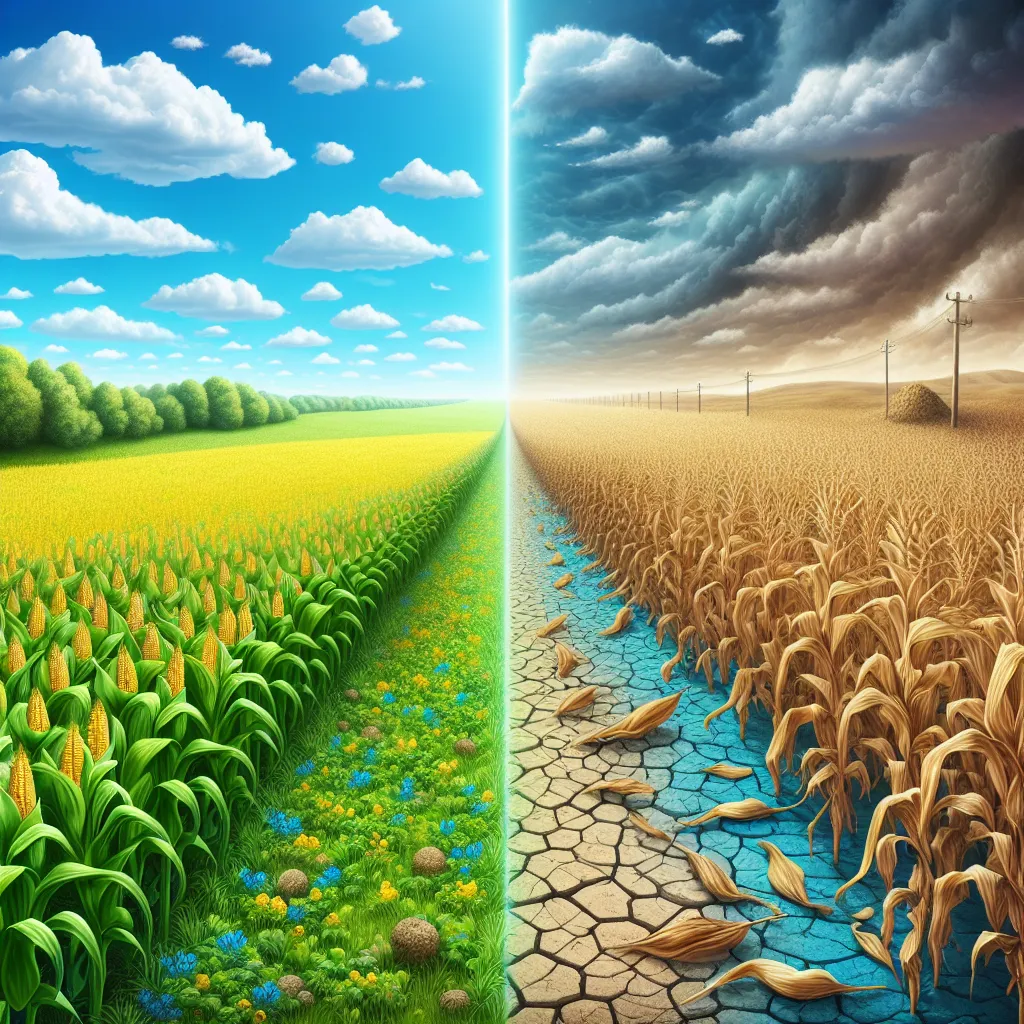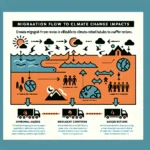The IELTS Reading section tests your ability to comprehend complex texts and answer various question types. Today, we’ll focus on a highly relevant topic: “Effects of Climate Change on Global Agriculture.” This subject has appeared frequently in past IELTS exams and, given its increasing importance, is likely to feature in future tests. Let’s dive into a practice exercise to sharpen your skills on this crucial issue.
 Climate change impact on agriculture
Climate change impact on agriculture
Practice Text: Climate Change and Global Agriculture
Reading Passage
Climate change is one of the most pressing issues of our time, with far-reaching consequences for every aspect of human life. Among its many impacts, the effects on global agriculture are particularly concerning. As the world’s population continues to grow, ensuring food security becomes increasingly challenging in the face of changing weather patterns, rising temperatures, and more frequent extreme weather events.
One of the primary ways climate change affects agriculture is through alterations in temperature and precipitation patterns. Many regions are experiencing shifts in their growing seasons, with some areas seeing earlier springs and longer summers, while others face shortened growing periods. These changes can disrupt the delicate balance of crop cycles, affecting both yield and quality. For instance, some crops may mature too quickly in warmer temperatures, reducing their nutritional value and overall yield.
Rising temperatures also contribute to increased water stress for crops. Higher evaporation rates and more frequent droughts in some areas mean that farmers must adapt their irrigation practices or risk crop failure. Conversely, other regions may experience more intense rainfall and flooding, which can damage crops and erode valuable topsoil. This variability in water availability poses significant challenges for agricultural planning and management.
The changing climate also influences the distribution and severity of pests and diseases that affect crops. Warmer temperatures can allow pests to survive winter in regions where they previously could not, leading to increased crop damage. Additionally, changes in humidity and rainfall can create more favorable conditions for the spread of plant diseases, further threatening agricultural productivity.
Climate change is also affecting livestock farming. Heat stress in animals can lead to reduced productivity, increased vulnerability to disease, and in severe cases, death. Changes in temperature and rainfall patterns also impact the availability and quality of pasture and forage crops, which are essential for grazing animals.
The ocean’s ecosystems, crucial for global fisheries, are not immune to climate change effects. Rising sea temperatures and ocean acidification are altering marine habitats, affecting fish populations and their distribution. This has significant implications for coastal communities that rely on fishing for both food security and economic stability.
Adapting to these changes requires a multi-faceted approach. Farmers are increasingly adopting climate-smart agricultural practices, such as using drought-resistant crop varieties, implementing water-efficient irrigation systems, and diversifying crops to spread risk. Additionally, there is a growing focus on sustainable farming methods that can help mitigate climate change by reducing greenhouse gas emissions and increasing carbon sequestration in soils.
On a global scale, international cooperation is crucial for addressing the challenges posed by climate change to agriculture. Sharing knowledge, technology, and resources can help vulnerable regions adapt more effectively. Moreover, reducing overall greenhouse gas emissions through policy changes and technological innovations is essential for limiting the long-term impacts of climate change on global food production.
In conclusion, the effects of climate change on global agriculture are complex and far-reaching. As we continue to grapple with this challenge, it is clear that adapting our agricultural practices and working together on a global scale will be key to ensuring food security for future generations.
Questions
1-5. Choose the correct letter, A, B, C, or D.
-
According to the passage, which of the following is NOT mentioned as a direct effect of climate change on agriculture?
A) Changes in growing seasons
B) Alterations in crop nutritional value
C) Increased use of chemical fertilizers
D) More frequent extreme weather events -
The passage suggests that changes in temperature and precipitation patterns can:
A) Always lead to increased crop yields
B) Only affect crop quality, not quantity
C) Disrupt crop cycles and affect both yield and quality
D) Have no significant impact on agriculture -
Which of the following is described as a consequence of rising temperatures on water availability for agriculture?
A) Uniform increase in rainfall across all regions
B) Increased water stress due to higher evaporation and more frequent droughts
C) Decreased need for irrigation in all farming areas
D) Consistent improvement in water availability for crops -
How does climate change affect pests and diseases in agriculture?
A) It eliminates all pests in colder regions
B) It has no impact on plant diseases
C) It can allow pests to survive in new regions and create favorable conditions for plant diseases
D) It only affects livestock diseases, not crop diseases -
What does the passage suggest about the impact of climate change on global fisheries?
A) It only affects freshwater fish populations
B) It has no significant impact on coastal communities
C) It alters marine habitats and fish distributions, affecting food security and economies
D) It uniformly increases fish populations in all oceans
6-10. Complete the summary below.
Choose NO MORE THAN TWO WORDS from the passage for each answer.
Climate change poses significant challenges to global agriculture, affecting various aspects of food production. Changes in temperature and precipitation patterns can disrupt (6) and impact both the yield and quality of crops. Increased water stress due to higher evaporation and more frequent droughts requires farmers to adapt their (7) practices. Climate change also influences the spread of pests and diseases, potentially leading to increased (8). Livestock farming is affected through heat stress on animals and changes in the availability of (9) for grazing. To address these challenges, farmers are adopting climate-smart practices and focusing on (10)___ farming methods that can help mitigate climate change impacts.
Answers and Explanations
-
C
Explanation: The passage does not mention increased use of chemical fertilizers as a direct effect of climate change on agriculture. It discusses changes in growing seasons, alterations in crop nutritional value, and more frequent extreme weather events, but not fertilizer use. -
C
Explanation: The passage states, “These changes can disrupt the delicate balance of crop cycles, affecting both yield and quality.” -
B
Explanation: The text mentions, “Higher evaporation rates and more frequent droughts in some areas mean that farmers must adapt their irrigation practices or risk crop failure.” -
C
Explanation: The passage explains that warmer temperatures can allow pests to survive in new regions and that changes in humidity and rainfall can create favorable conditions for plant diseases. -
C
Explanation: The text states that rising sea temperatures and ocean acidification are altering marine habitats and fish populations, affecting food security and economic stability of coastal communities. -
crop cycles
Explanation: The passage mentions that climate change can “disrupt the delicate balance of crop cycles.” -
irrigation
Explanation: The text states that farmers must “adapt their irrigation practices” due to water stress. -
crop damage
Explanation: The passage mentions that pests surviving in new regions can lead to “increased crop damage.” -
pasture
Explanation: The text refers to changes affecting “the availability and quality of pasture and forage crops” for grazing animals. -
sustainable
Explanation: The passage mentions a “growing focus on sustainable farming methods” to help mitigate climate change impacts.
Common Mistakes to Avoid
When tackling IELTS Reading questions on topics like climate change and agriculture, be aware of these common pitfalls:
- Overthinking: Stick to the information provided in the text rather than relying on your own knowledge of the subject.
- Misinterpreting negatives: Pay close attention to negative statements and words like “not,” “except,” or “unless.”
- Falling for distractors: Be cautious of answer options that use words from the text but in a different context.
- Ignoring context: Ensure you understand the overall message of each paragraph, not just isolated sentences.
- Time management: Don’t spend too much time on difficult questions; move on and return if time allows.
Key Vocabulary
- Climate change: /ˈklaɪmət tʃeɪndʒ/ (noun) – Long-term alteration of temperature and typical weather patterns in a place.
- Agriculture: /ˈæɡrɪkʌltʃər/ (noun) – The science or practice of farming, including cultivation of the soil for growing crops and rearing animals.
- Food security: /fuːd sɪˈkjʊərəti/ (noun) – The state of having reliable access to a sufficient quantity of affordable, nutritious food.
- Precipitation: /prɪˌsɪpɪˈteɪʃən/ (noun) – Rain, snow, sleet, or hail that falls to the ground.
- Evaporation: /ɪˌvæpəˈreɪʃən/ (noun) – The process of turning from liquid into vapor.
- Irrigation: /ˌɪrɪˈɡeɪʃən/ (noun) – The supply of water to land or crops to help growth, typically by artificial means.
Grammar Focus
Pay attention to the use of conditional sentences in discussions about climate change:
-
Zero conditional: For general truths
Example: If temperatures rise, crops mature more quickly. -
First conditional: For likely future scenarios
Example: If we don’t adapt our farming practices, food security will be at risk. -
Second conditional: For hypothetical situations
Example: If we implemented sustainable farming methods globally, we would see a significant reduction in agricultural emissions.
Tips for Success
- Practice active reading: Engage with the text by predicting content, asking questions, and summarizing key points.
- Improve your vocabulary: Regularly study topic-specific terms related to environment, agriculture, and climate change.
- Develop your skimming and scanning skills: Learn to quickly identify main ideas and locate specific information.
- Stay informed: Regularly read articles on current global issues to familiarize yourself with common themes and vocabulary.
- Time management: Practice completing reading tasks within the allocated time to improve your speed and efficiency.
By focusing on these areas and regularly practicing with diverse texts, you’ll be well-prepared to tackle any IELTS Reading passage on climate change and its effects on global agriculture. Remember, understanding the topic deeply not only helps in the IELTS test but also contributes to your awareness of critical global issues.
For more practice on related topics, check out our articles on the effects of climate change on natural resources and challenges in global food distribution networks. These will provide additional context and vocabulary to enhance your understanding of this crucial subject.


